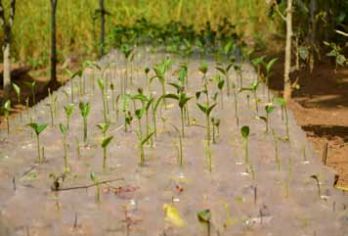
The Umsalait CLF was started in 2011. A small-scale CLF, it consists of 4 SHGs with a total of 40 members. Most households in this area are producers of rice, ginger and turmeric. The CLF started its Community Nursery in May/ June 2015, investing Rs. 5,000 from its own CLF fund and receiving Rs. 50,000 from the Meghalaya Basin Development Authority (MBDA) under its IBDLP Community Nursery initiative.
While the initial mobilisation and informational sessions were held by field implementation teams from MBDA, 2 Master Trainers from Umsalait visited Cham Cham (East Jaintia Hills District) for further training on Community Nurseries. With the support of these startup funds, training, and the commitment of the CLF members, the Community Nursery has grown to have 10,000 saplings within just 4-5 months of starting.
DETAILS OF OPERATIONS
The land used by the Umsalait CLF for this nursery is village Land. While no written document or agreement has been created to note this, the village headman and village elders have provided a verbal commitment to the CLF that they shall be permitted to use this land specifically for the purposes of setting up and maintaining their Community Nursery. A variety of saplings are grown in this nursery, from Jackfruit to Plum, Oranges, and Soh Phoh. Just around the time of this case study, the community was preparing the beds for plum, orange, and Soh Phoh saplings; sowing traditionally starts after winter. The SHGs making up the Umsalait CLF are active participants in the Community Nursery social enterprise. At any given time, around 5 – 10 SHG members can be found working in various capacities at the nursery. The CLF maintains a register to record time contributed by each individual. Wages are paid to each one of them based on these records. Once the Community Nursery reaches a viable scale and size, the returns generated are expected to benefit all CLF members, with a portion of funds being deposited in the collective CLF fund.
INITIAL CHALLENGES
Of all the saplings grown, about 40% are used for greening of the catchment areas in this region itself. The rest are expected to be sold in the market or to various government departments engaged in plantation activities. At present the community members are primarily dependent upon MBDA for helping sell their saplings, but the market linkages created during this period are expected to help the community directly handle sapling sales and marketing over time. One initial problem being faced by the CLF is access to high value horticultural sapling varieties. Overall however, CLF members seemed fairly confident that their nursery would become an important source of livelihood for them in the near future.
INSIGHTS FROM COMMUNITY INTERACTIONS
When asked about their goals for the Community Nursery, CLF members mentioned economic livelihood as a priority outcome. While the assurance of economic returns is a key reason that Community Nurseries were conceptualised in “Enterprise Mode”, the community’s feedback indicates that it would be important for the CLF to put down a clear system of revenue sharing right from the start. This could help prevent future conflicts between CLF members over distribution of benefits. While the Umsalait CLF is small in size which can help maintain cooperation, not all members agree on the operational aspects of the Community Nursery. The Knowledge Management team observed some indications of minor conflicts arising among the CLF members, which would be important to address sooner rather than later in order to ensure smooth functioning and sustainability of this Community Nursery.
In a short span of time, the CLF has converted its Community Nursery into an early success. The lack of too many other livelihood options in this area and the elimination of coal mining as a primary livelihood activity has forced these community members to seriously invest time and resources into making their Community Nursery a viable, alternate source of livelihood. Members of the CLF expressed their strong belief that with MBDA’s support, this would indeed be the case.